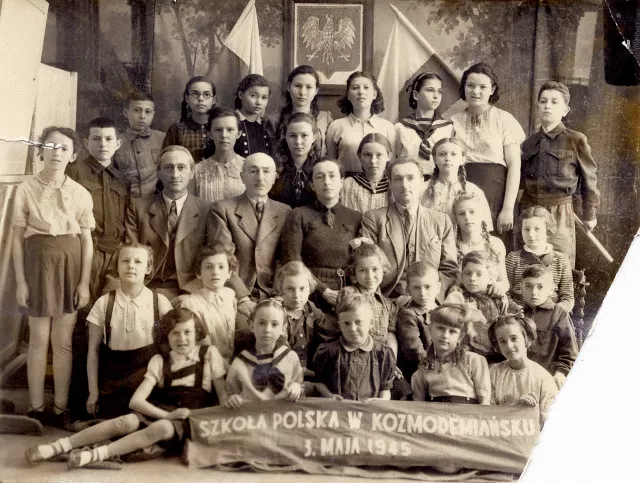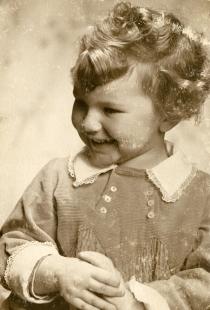This picture was taken in a Polish school for mostly Jewish children in Koz'modem'yansk, USSR. All the children and teachers had been deported from Poland. I’m sitting in the middle, in a black dress. My daughter Halinka is standing in the top row, second from right. This picture was taken 3 May 1945.
When war was about to break out we went east, and ended up in Lwow for a while. I don't know when exactly it was that they deported us from Lwow, but it was no longer winter. It was March, April 1940. We were traveling for a terribly long time. About 3 weeks. They would stop for a moment, sometimes in the day, sometimes at night, so that people could jump out to relieve themselves. We were taken to this port on the Volga, this small town. I don't remember the name. From there we sailed all night by ship to Koz'modem'yansk [approx. 150 km. from Kazan]; that was a very nice port on the Volga, and there was a railroad station there. That was in the Mariy El Autonomous Soviet Republic [in December 1941 there was a Polish population of 4,000 there]. Apparently 500 people arrived with us on that train. Later that same day we were taken 35 km into the forest, where we found a cottage to stay with 2 other families.
Men and women worked in the forest. My husband worked, my husband's brother, and Irena - his niece. She had just passed her school-leaving exams. Yes. I mean, women didn't fell trees, they just sawed branches or felled trees into smaller blocks, and then stacked the blocks. I had a small child, and there were the in-laws, elderly people, so I didn't have to work in the forest. Neither did my husband’s sister Giza, because she was… I don't know how old. Over 50. Later on, by coincidence, my cousin Maurycy Wiener was also deported to Koz'modem'yansk, and worked in the same gang as my husband.
My husband was chopping wood for a factory. And one time he mentioned to his director that I wanted a job. What we wanted was for me to have the right to exist there, to have a bread ration. And that director, a woman, hired me first of all as a gardener. I had no idea about gardening! They showed me the shears and told me to cut the tomatoes as they started to ripen. So I spent maybe 2 weeks on the tomatoes. Then my director said that I wasn't going to be in the garden, but in the mill. I spent half a day there theoretically getting experience. They taught me which grain was for what - before that I knew next to nothing. What it was called, what my title was at that mill? I can't remember. I was paid well, every week I would get a small bag of flour, every Saturday. That was a fortune. There was a free canteen.
The Union of Polish Patriots organized a Polish school in Koz'modem'yansk. I'd only done 3 years of my degree course [out of 5], but I had my teaching qualifications, and there were an awful lot of Polish children. Polish… I mean Jewish, mostly Jewish. And I taught the children in Koz'modem'yansk along with this Mrs. Hajdukiewicz, a teacher from Lwow. Me up to 4th grade and her up to 7th grade. We were just allocated days and classrooms in a Russian school, and we went there and taught. My Halinka went to that school too. I had something like 15 children in each class.
My husband contracted heart problems. He worked very hard. Before that he'd been a physically healthy, handsome man, but chopping wood in a forest in sub-zero temperatures..., and what kind of nourishment did we have? I called a doctor, his grandfather had been a Polish exile, and he was 3rd-generation, still understood some Polish. A very decent man. What was his name? I can't remember. Because he saw the conditions we were living in, he took my husband into the hospital. There were no patients on the men's ward at all, just one patient and my husband the second, because there was a war on and all the men were at war. He was in hospital for a long time, and in the end, the doctor said to me: 'Take him home, because he won't live.' He died in March 1944. He was buried in a Russian cemetery. No, it wasn't a Jewish cemetery. It was this neglected cemetery, a few people died, so they were buried there. The cemetery wasn't looked after very well there.
Irena and a friend worked in the forest, and one day the girls came running home and Irena shouts: 'The war's going to end! We'll be leaving here soon. I heard on the radio that peace has been signed.' We looked at her: what's she talking about - we knew nothing. What was a newspaper, a radio? Well, and it was true. Very shortly, a few weeks later, Genek, Irena's fiance, came back from the front. They had the right to leave the front and take their families back to Poland, you see. And they all - Genek and his brother, their parents, Irena, Giza and Heniek - went to Moscow, and from Moscow smart as anything went back to Poland. Yes, later on Irena married Genek.
Halinka and I stayed. We moved from the cottage into a little room in a Russian woman's apartment. I surrendered my driving license, as the only document proving that I was a Polish citizen, so that I could return to Poland. In spring 1946 we traveled in goods wagons to Poland. We could only leave when they put on an 'eshelon' [a military transport unit, in this case a train]. They gave us 24 hours to get to the railroad station, too. People went in horses and carts. Not everybody had to, but everybody left.



















